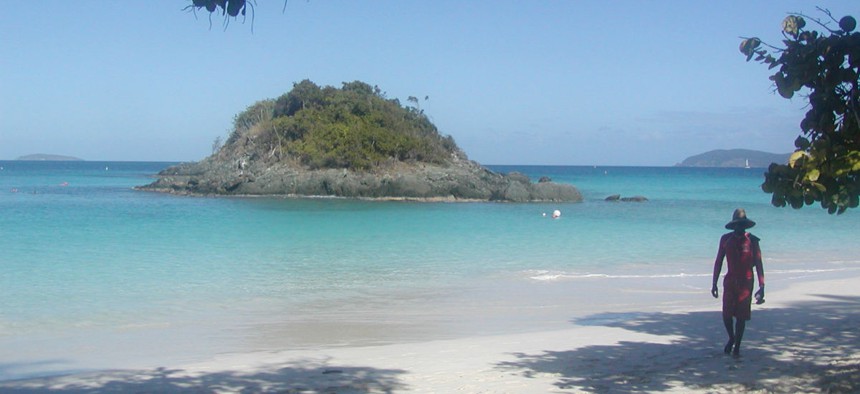
Trunk Bay, part of the Virgin Islands National Park. The park was established through donations from the Rockefeller family, Jarvis noted in a letter to the Post. Carlin Timmons / Interior Department file photo
Park Service Defends Partnerships Against Fears of Commercialism
Director Jarvis cites stretched budget, says NPS has engaged corporate America and private philanthropists for 100 years.
National Park Service Director Jonathan Jarvis took to the Washington Post letters column to defend his agency’s partnerships with private interests against suggestions that he is selling the park treasures to crass commercial sponsors.
The Post on May 10 had published a story suggesting a Yosemite sponsored by Starbucks, noting a March draft order from Jarvis that expands the agency’s long-standing partnerships with commercial, philanthropic and private nonprofit entities. In laying out terms, the order says, “The NPS generally will not accept a donation that imposes, or purports to impose, any long-term conditions or obligations on the NPS.”
It was accompanied by a piece by federal columnist Joe Davidson noting past concerns about Park Service commercialization by the Government Accountability Office and this week from the nonprofit Public Employees for Environmental Responsibility. “Large corporate donations exert a not-so-subtle gravitational pull on park managers increasingly dependent on these donors for their budgets,” said PEER Executive Director Jeff Ruch in a press release. “We are concerned that influence peddling will soon become a major recreational activity in our national parks,” he added, saying PEER is already hearing from park employees under pressure to placate donors.
Jarvis on Friday wrote, “Sensational headlines aside, the National Park Service has engaged corporate America and private philanthropists for 100 years, from the establishment of Acadia and Virgin Islands national parks through donations from the Rockefeller family, to the 1960s ‘See the USA in your Chevrolet’ campaign with the auto industry.”
He cited more recent contributions from Coca-Cola for recycling, Toyota and Ford donations of vehicles, and philanthropist David Rubenstein’s gift to refurbish the Washington Monument after the 2011 earthquake.
“Since 2010, I have testified before Congress that the National Park Service needs more federal appropriations to care for our parks,” Jarvis said. “We receive about half of what is needed to keep even with the deterioration of parks, roads, bridges, tunnels, historic homes and visitor centers. Congress demanded that we raise fees, increase philanthropic giving and sponsorships and leverage what funds we have. We are doing that by updating policies to industry-standard techniques while protecting the integrity of these sacred places,” which includes, he added, telling historical stories with “professionalism.”
Jarvis got some backing for the new directive’s flexibility—with caveats-- from the nonprofit National Parks Conservation Association. “We support the order’s intent to allow for additional opportunities to recognize donors, but that should not commercialize the park experience,” the association’s president and CEO Theresa Pierno said in a statement. “The National Park Service has always depended on donations to supplement funding from Congress, but we don’t want this order to create a new landscape that allows Congress to abdicate its duty to provide parks with the funding they need for rangers, repairs and other responsibilities.”
In addition, “this revised policy needs to make sure the system for promoting and accepting donations does not become a requirement for park staff that competes with the fundamental needs of our parks,” Pierno said. “We also do not want to see the role of NPS staff as fundraisers compete with nonprofit partners and create confusion among donors.”







